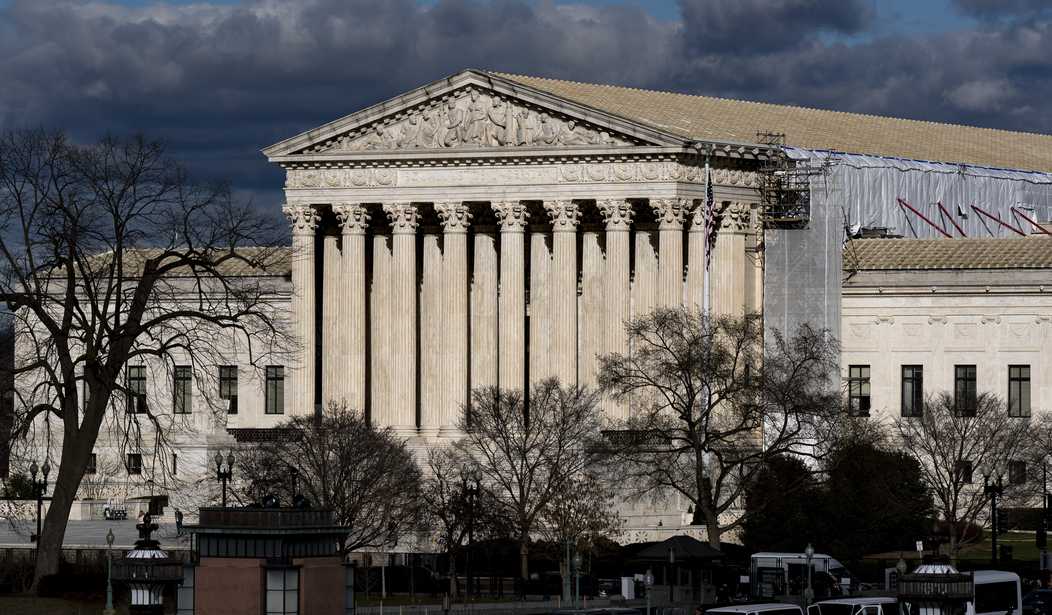A half-dozen of the 18 amicus briefs submitted to the Supreme Court this week in Smith & Wesson et al v. Estados Unidos Mexicanos come from Second Amendment organizations. The sheer number of briefs that have been filed in support of the gunmakers being sued by the Mexican government is a sign of the importance of the ongoing court fight, not only because of the $10 billion that Mexico is trying to extort from companies like Smith & Wesson, but because this case will help determine whether the Protection of Lawful Commerce in Arms Act is going to offer much protection for lawful commerce in arms going forward.
You can find the full list of amicus briefs here, but we'll focus on those briefs filed by 2A groups in this post, starting with the brief from a coalition of organizations including Gun Owners of America, Gun Owners of California, Heller Foundation, Tennessee Firearms Association, Grassroots NC, Rights Watch International, and the Virginia Citizens Defense League.
The groups contend that Mexico's lawsuit is an attempt to make U.S. businesses "pay for the problems largely of Mexico’s own making"; namely, its inability and unwillingness to confront and combat the multinational criminal syndicates that have inflicted mayhem in much of the country.
Since Mexico will not allow its citizens to protect themselves from criminals, and compounds the problem by being unable or unwilling to take effective action against drug cartels, like governments everywhere, the Mexican government looks to affix blame elsewhere. ... And, in the process, Mexico would be defacto exporting its restrictive gun policies into the United States by bankrupting the American firearms industry and thereby undermining our Second Amendment which embodies American view that the People are sovereign, a view which Mexico does not share.
The Firearms Policy Coalition's brief, meanwhile, focuses exclusively on the Protection of Lawful Commerce in Arms Act, warning if Mexico's lawsuit is allowed to continue "a cascade of litigation" aimed at gunmakers is sure to follow.
Mexico’s attempt in this litigation to impose a foreign nation’s policy preferences on the American people through judicial fiat and exact a financial penalty that would cripple the American firearms ecosystem would be deeply troubling even if it stood alone. It does not. To the contrary, this action is merely one of a phalanx of recent, abusive lawsuits brought by anti-Second-Amendment activists, organizations, and governments. These suits all share a single purpose: to force the firearms industry to defend against a war of attrition that it will lose even if it wins, because the cost of the defense alone is enough to bring the industry to its knees. Remington Arms has already lost this no-win “lawfare”—driven into bankruptcy regardless of the legal merits of the industry’s defense against the tsunami of litigation.
The Second Amendment Foundation's brief gives further weight to that argument, noting that "allowing a foreign government to pierce the PLCAA’s protections poses significant risks to firearm manufacturers that flow to the American people."
If allowed to stand, the decision below promises to spur a new wave of lawsuits against firearm manufacturers—bringing massive litigation costs along with it. Those costs will inevitably pass to consumers in the form of higher prices and restricted inventory. These increased costs will price many Americans out of the ability to lawfully own and possess firearms. Inevitably, many manufacturers will be unable to survive this new onslaught of lawfare, which will further shrink the pool of firearms that Americans may choose from to arm themselves for self-defense and other lawful purposes. Indeed, Americans who seek to exercise their Second Amendment rights will suffer most. Mexico’s attempt to hold Petitioners legally responsible for the criminal activity of others is precisely the type of lawsuit that Congress designed the PLCAA to block.
Which is why U.S. District Judge Dennis Saylor originally dismissed the Mexican government's lawsuit. Unfortunately, the First Circuit Court of Appeals revived it, which is why the case is now before the Supreme Court. The lawsuit hasn't yet gone to trial. In fact, Saylor recently dismissed most of the claims a second time after concluding that most of the companies that were sued for allegedly aiding and abetting cartel violence had no real connection to the state of Massachusetts, where the lawsuit was filed.
NRA's brief, which was also co-signed by the FPC Action Foundation and Independence Institute, argues that Mexico's "attempt to scapegoat lawful American companies" is precisely why Congress adopted the PLCAA back in 2005, while at the same time debunking many of Mexico's claims.
Mexico seeks billions of dollars in damages and the imposition of extensive gun controls in America while relying on shoddy data and false allegations to exaggerate the impact of Petitioners’ firearms on Mexican homicides.
Mexico argues that Petitioners “exploited” the September 2004 sunset of the federal ban on sales of so-called “assault weapons” “to vastly increase production, particularly of the military-style assault weapons favored by the drug cartels.” Consequently, Mexico argues, Mexican homicides “increased dramatically beginning in 2004 exactly contemporaneously with [Petitioners’] increased production, distribution, and marketing of their military-grade weapons.” In fact, Mexico’s homicide rate was lower during each of the first three years after the ban’s expiration (2005–2007) than during any year in which the ban was in effect (1995–2003).
Mexico further contends, “The increased percentage of homicides by gun was contemporaneous with the increased gun production in the U.S. beginning in 2005 with the expiration of the U.S. assault-weapons ban.” Rather, from 1995–2010, the year with the highest percentage of Mexican homicides by gun was 1999 (60.1%), when the“assault weapons” ban was in full force.
The National Associaton of Gun Rights' brief largely focuses on the "proximate cause" argument used by the First Circuit Court of Appeals to revive Mexico's lawsuit. The PLCAA contains a provision that states if a manufacturer or seller of a firearm "knowingly violated a state or federal statute applicable to the sale or marketing of the product, and the violation was a proximate cause of the harm for which relief is sought,” then a lawsuit could take place without running afoul of the PLCAA's protections. As NAGR's attorneys argue, the First Circuit adopted an overly expansive approach to "proximate cause" in order to keep the lawsuit afloat.
The First Circuit asserted that “Mexico’s claim of proximate cause is straightforward: defendants aid and abet the trafficking of guns to the Mexican drug cartels, and this trafficking has foreseeably required the Mexican government to incur significant costs in response to the increased threats and violence accompanying drug cartels armed with an arsenal of military-grade weapons.” These “costs” include “costs of additional medical, mental health, and other services for victims and their families; costs of increased law enforcement, including specialized training for military and policy; costs of the increased burden on Mexico’s judicial system, diminished property values; and decreased revenues from business investment and economic activity.” \
This “straightforward” chain is little better than the broad “foreseeability” analysis this Court rejected in Bank of America. There, much like Mexico’s aiding and abetting claims against Petitioners, the City of Miami alleged that a Fair Housing Act (FHA) violation by two banks caused the City a litany of wide-reaching issues related to its efforts to “assure racial integration” and secure “the benefits of an integrated community.” This Court thus had to answer: “Did the Banks’ allegedly discriminatory lending practices proximately cause the City to lose property-tax revenue and spend more on municipal services?”
The Court’s answer was an emphatic, “no.” The City’s theory of causation was simply “too remote” to sustain proximate cause. Because “[t]he housing market is interconnected with economic and social life,” a “violation of the FHA may ‘be expected to cause ripples of harm to flow’ far beyond the defendant[s’] misconduct.’” And because “[n]othing in the statute suggests that Congress intended to provide a remedy wherever those ripples travel,” “entertaining suits to recover damages for any foreseeable result of an FHA violation would risk ‘massive and complex damages litigation.’”
NAGR contends those same concerns apply to Mexico's lawsuit, given that the firearms industry "is not only interconnected with American economic and social life, but also with the deepest foundations of America’s political culture and Americans’ relationship to their government."
The Firearms Regulatory Accountability Coalition, along with Silence Shop, SB Tactical, and Palmetto State Armory also touched extensively on the predicate cause exception in their brief with the Court, in which they argue the First Circuit has "ignored Congress’s judgment about firearms regulation in the United States, instead stretching to the breaking point common-law concepts incorporated into the narrow predicate exception in the Protection of Lawful Commerce in Arms Act (“PLCAA”) in order to hold that Mexico’s suit could proceed."
At bottom, the PLCAA comes with a promise: Those who faithfully comply with the Nation’s expansive regulatory regime need not fear private civil liability. As Congress explained: Businesses in the United States that are engaged in interstate and foreign commerce through the lawful design, manufacture, marketing, distribution, importation, or sale to the public of firearms or ammunition products that have been shipped or transported in interstate or foreign commerce are not, and should not, be liable for the harm caused by those who criminally or unlawfully misuse firearm products or ammunition products that function as designed and intended.
In other words, Congress and the States may regulate; private litigants may not.The First Circuit’s rejection of this compromise will generate the very legal uncertainty the PLCAA was designed to quash. If allowed to stand, lawful conduct may now be subject to the review of innovative plaintiffs’ attorneys, ultimately resulting in, as the PLCAA warns, “the disassembly and destabilization of other industries and economic sectors lawfully competing in the free enterprise system of the United States.”
The National Shooting Sports Foundation's brief echoes those concerns, arguing that Mexico's lawsuit is part of a larger trend of trying to get around the PLCAA's protections, either through abusing the predicate cause proviso or by creating "public nuisance" laws aimed at lawful firearm industry practices.
While the fate of those laws and lawsuits must await another day, their existence is all the more reason why the Court should take this opportunity to explicate clearly the meaning and protections of the PLCAA. As explained here and in petitioners’ brief, Mexico’s lawsuit implicates almost every hot-button issue in U.S. firearms policy and would leverage our court system to allow a foreign government to pretermit a range of debates currently underway in Congress and statehouses throughout the Nation. Rejecting that effort, and the First Circuit’s decision rubber-stamping it, will send an unmistakable signal to cities, states, and lower courts intent on undermining the Second Amendment—which is exactly what Congress enacted the PLCAA to prevent.
The Supreme Court's previous decision not to intervene in the lawsuit against Remington seeking to hold it responsible for the Sandy Hook murders arguably helped to create a situation where Mexico (and their allies in the gun control lobby) felt empowered to file a suit of its own against gunmakers. Thankfully, the Court has agreed to hear the current pleas for relief from companies like Smith & Wesson, and with oral arguments scheduled for March, we should know whether the PLCAA will be rendered toothless or (more likely, in my opinion) return to the state that Congress intended: as a check on abusive lawsuits that seek to hold gun makers and sellers responsible for the criminal acts of others.









